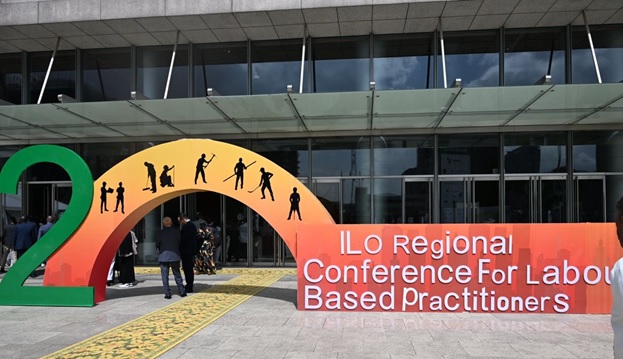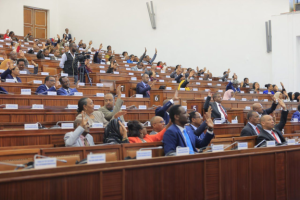
ADDIS ABABA –Ministers and senior officials from over 25 African countries have reaffirmed their commitment to promoting employment-intensive investments as a key driver for sustainable development, inclusive economic growth, and resilience across the continent.
The announcement came at the conclusion of the 20th Regional Seminar for Labour-based Practitioners, held in Addis Ababa from May 19–20, 2025.
Co-chaired by Ethiopia’s Minister of Urban and Infrastructure, Chaltu Sani, and Fanfan Rwanyindo Kayirangwa, ILO Assistant Director General and Regional Director for Africa, the seminar convened under the theme: “Resilient Communities and a Healthy Environment: The Employment Intensive Investment Programme Approach.”
The delegates adopted a robust Ministerial Declaration, outlining 24 commitments to advance job creation, social cohesion, environmental sustainability, and inclusive infrastructure development, particularly for youth, women, and marginalized communities.
The declaration emphasized the urgent need to tackle youth unemployment and underemployment, particularly as Africa continues to face limited productive employment opportunities for its fast-growing population.
Ministers stressed the importance of aligning national strategies with the African Union’s Agenda 2063, calling for greater coordination between public institutions, private sectors, and local communities.
A key pillar of the declaration is the strengthening of Employment Intensive Investment Programmes (EIIP), which have proven effective in generating decent jobs, building local infrastructure, and fostering community ownership. The approach also contributes to climate resilience and environmental conservation through nature-based solutions such as land restoration and reforestation.
The seminar also acknowledged the rapid transformation of the world of work due to digital technology and artificial intelligence. Recognizing the digital divide, especially in rural areas, African leaders committed to expanding ICT infrastructure and introducing AI and cyber security skills training for youth and women.
A strong emphasis was placed on integrating skilling, reskilling, and certification into public works and infrastructure projects. Governments agreed to require apprenticeships, internships, and on-site training as part of their procurement and implementation frameworks to ensure long-term employability.
The declaration called upon development partners, international financial institutions, and climate funds to increase investment in job creation, infrastructure, and skill development initiatives aligned with the Abidjan Declaration and AU Agenda 2063. Ministers urged the ILO, World Bank, IMF, and African Development Bank to integrate employment markers and social dimensions into their financing strategies.
African leaders pledged to promote transparent, inclusive, and corruption-free public employment programmes, ensuring opportunities reach intended beneficiaries. Gender equality was highlighted as a core goal, with countries committing to adopt inclusive policies that guarantee women’s equal participation and benefit from employment-intensive investments.
In a forward-looking agenda, the declaration mandates the ILO to provide expanded technical assistance, facilitate South-South cooperation, and monitor implementation progress ahead of the 21st Regional Seminar. Ministers also committed to sharing best practices across countries and adopting innovative approaches to transition workers from informal and temporary roles into formal, sustainable employment pathways.
In their closing remarks, the delegates expressed deep appreciation to the Government and People of Ethiopia for their hospitality and successful hosting of the seminar in Addis Ababa.
BY YESUF ENDRIS
THE ETHIOPIAN HERALD WEDNESDAY 21 MAY 2025




